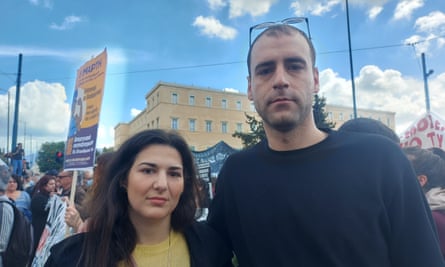Greece’s prime minister has apologised for the worst rail accident in the country’s history as a station master facing multiple charges including involuntary manslaughter was remanded in custody after giving testimony in court.
Amid mounting protests prompted by the disaster, magistrates unanimously agreed that the 59-year-old should be detained pending trial. The employee, described by the Greek media as being in post for only four days before Tuesday’s tragedy, has not been named publicly. He appeared in court in Larissa, the city where the doomed locomotive last stopped before ramming, head-on and at high speed, into a freight train using the same track.
His lawyer, Stefanos Pantzartzidis, had earlier told reporters his client was “devastated”. “He assumes the blame proportionate to him,” he said.
The station master addressed the court for more than seven hours. As the last person to speak to the driver of Intercity 62 – bound for Thessaloniki from Athens and carrying 350 passengers – his testimony had been seen as key to answering the ever mounting questions the accident has posed.
Exactly 15 minutes after their conversation, at 11.23pm, the collision occurred.
On impact, the front three carriages exploded into flames, killing 57, the majority of them young people returning home from a long holiday weekend. Scores of others were injured as the wagons derailed, ejecting passengers through windows. Many are still thought to be missing.

As funerals were conducted, after the macabre process of identifying victims incinerated in the crash, the prime minister, Kyriakos Mitsotakis, apologised on Sunday for the train crash, insisting that in 2023 it should never have happened.
“As prime minister, I owe everyone, but above all to the relatives of the victims, a big ‘sorry’. Both personally, and in the name of all those who ruled the country for years,” he said.
In a statement that struck a noticeably more tempered tone than his initial pronouncement blaming the accident on “tragic human error”, Mitsotakis suggested there were wider failures at play, saying it should not “be possible for two trains moving in opposite directions to be on the same track and not be noticed by anyone”.
“We cannot, will not, and must not hide behind human error,” he wrote on Facebook, vowing that he would seek additional funding and technical know-how from the EU and “other friendly countries so that we can, finally, obtain modern trains”.
The disaster has put a network described as the most dangerous railway system in Europe under an unprecedented spotlight. Railroad unions have, for years, warned of the perils inherent in a system blighted by poor equipment, inadequate training and chronic understaffing. The accident exposed not only the lack of safeguards, but also the absence of properly functioning signals that could have warned of the impending crash.
Rail union members, who have since walked off the job with strikes that have paralysed train travel across Greece, joined around 12,000 protesters in Athens on Sunday as anger over a tragedy increasingly seen as preventable intensified. Leftist leaders present said both the protests and industrial action were vital to avoid the inquiry into the tragedy “becoming a cover-up”.
As in previous protests in the Greek capital and Thessaloniki, the nation’s northern metropolis, clashes broke out between Molotov-hurling anarchists and police in both cities, but only after thousands of students had marched peacefully to deplore “a crime” that many have come to believe was waiting to happen.

Increasingly, criticism has focused on the slipshod mentality seen as predominant in the state sector, which had continued to maintain Greek railways after the train operator was privatised as part of asset-stripping during the country’s debt crisis.
“It could have been any one of us on that train,” said Despoina Karayiannidou, aged 30, who hails from Thessaloniki, posing with her friend Paschalis in front of the Greek parliament before hundreds of black balloons were released in honour of the dead.
“For, too long, EU funds in this country have ended up in the wrong pockets instead of going where they should. We are here to grieve, but this is also a tragedy about how Greece is governed. It’s very important it isn’t covered up.”
Mitsotakis, whose four-year term ends in July, has ordered what he has called an independent cross-party committee to look into the causes of the accident. The leader has promised that “responsibilities will be assigned” for the disaster before elections in the spring.
The tragedy represented the worst side of Greece, he said. “We all know the nation’s railroads are deeply problematic. They are perhaps the extreme expression of a Greece that doesn’t befit us and which we want to leave behind.”

 1 year ago
68
1 year ago
68










 English (US)
English (US)